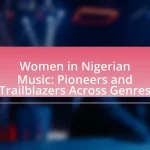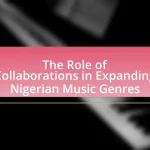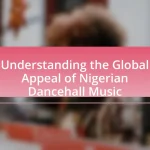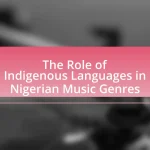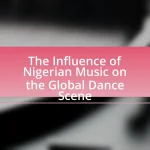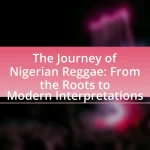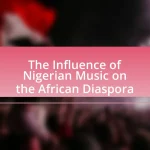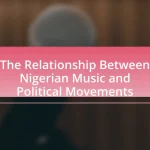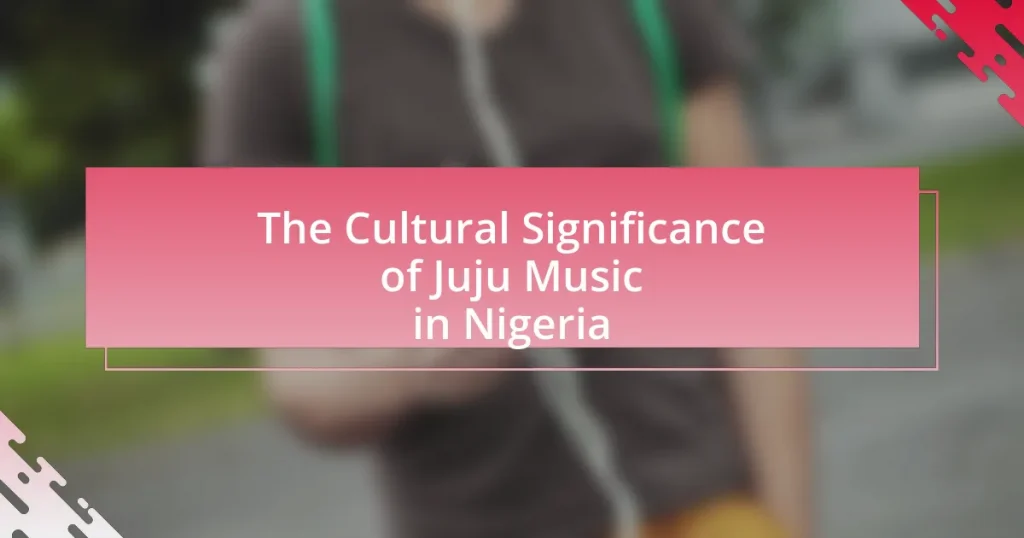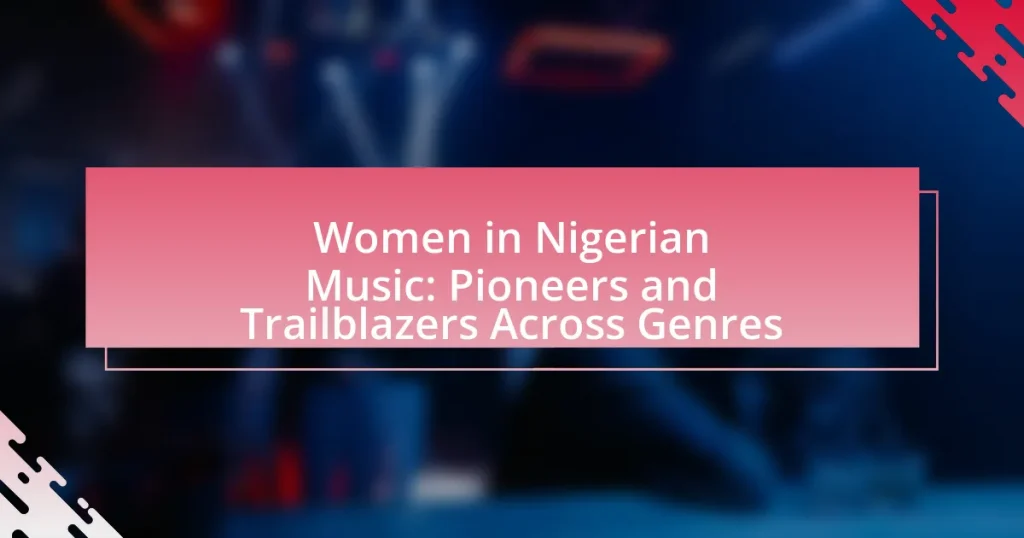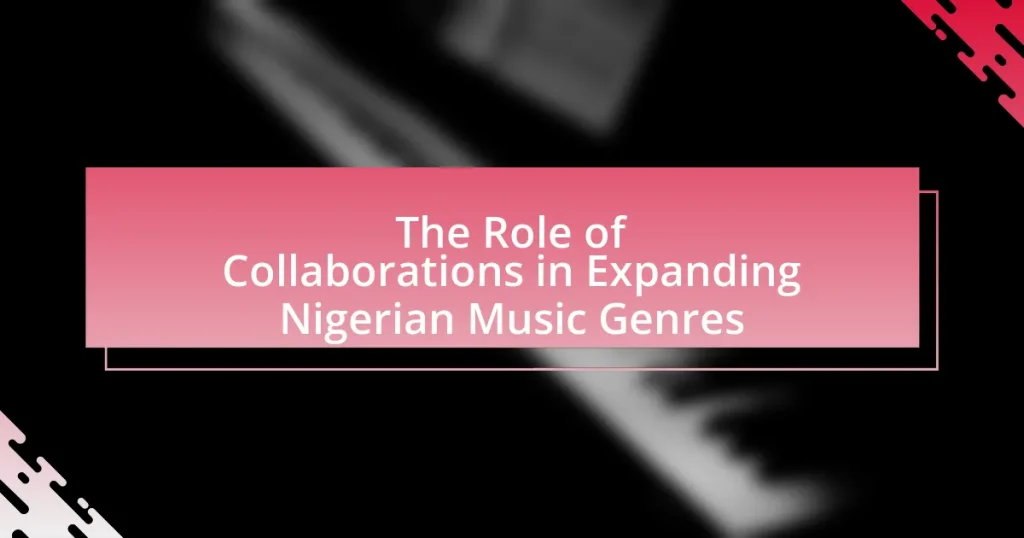Juju music is a significant cultural artifact in Nigeria, originating from the Yoruba people and serving as a medium for social commentary, cultural expression, and community cohesion. The genre has evolved since the early 20th century, blending traditional rhythms with Western influences and addressing social issues through its lyrics. Prominent artists like King Sunny Adé and Ebenezer Obey have played crucial roles in popularizing Juju music, which fosters unity among diverse ethnic groups and influences political awareness. The article explores the historical development, contemporary trends, and challenges facing Juju music, emphasizing its importance in preserving cultural identity and promoting social change in Nigeria.
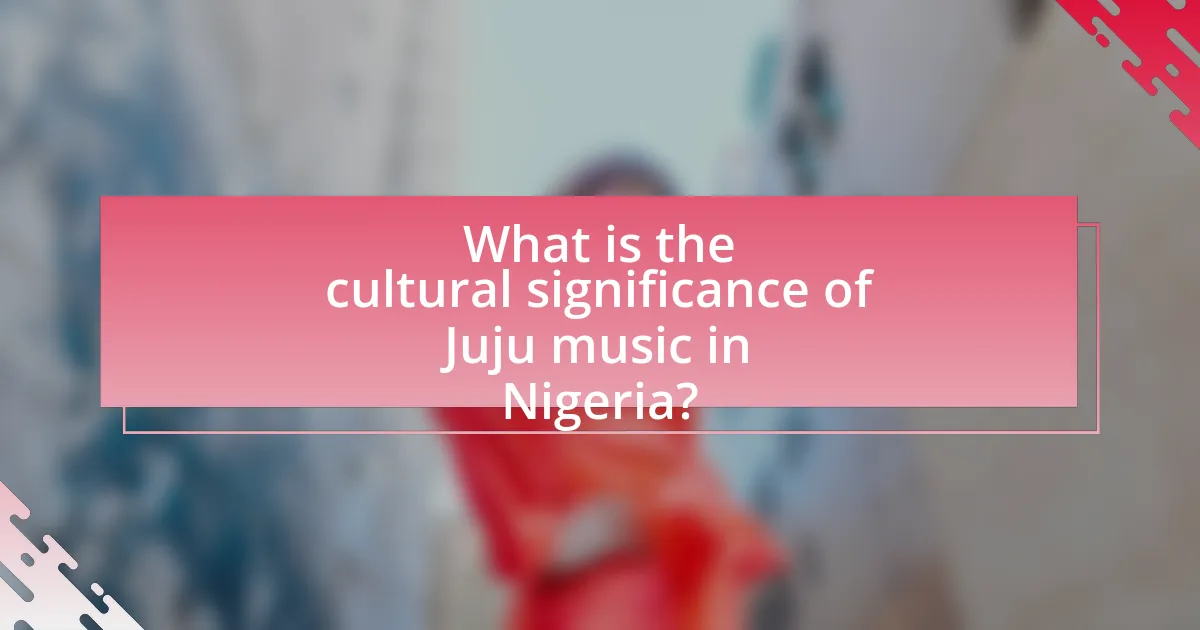
What is the cultural significance of Juju music in Nigeria?
Juju music holds significant cultural importance in Nigeria as it serves as a medium for social commentary, cultural expression, and community cohesion. Originating from the Yoruba people, Juju music incorporates traditional rhythms and instruments, reflecting the rich heritage and values of Nigerian society. The genre often addresses social issues, celebrates cultural identity, and fosters unity among listeners, particularly during communal gatherings and celebrations. Historically, prominent Juju musicians like King Sunny Adé and Ebenezer Obey have used their music to influence societal change and promote Yoruba culture, thereby solidifying Juju music’s role as a vital cultural artifact in Nigeria.
How did Juju music originate and evolve in Nigeria?
Juju music originated in Nigeria in the early 20th century, primarily among the Yoruba people, as a fusion of traditional Yoruba music and Western musical influences. This genre evolved through the incorporation of instruments such as the guitar, keyboard, and percussion, reflecting the cultural exchange that occurred during colonial times. Notably, artists like Tunde Nightingale and later, King Sunny Adé, played pivotal roles in popularizing Juju music, which gained international recognition in the 1980s. The genre’s evolution is marked by its adaptability, blending traditional rhythms with modern sounds, thus maintaining its relevance in contemporary Nigerian music culture.
What are the historical influences on the development of Juju music?
Juju music developed primarily from the Yoruba traditional music, incorporating elements from various historical influences such as the introduction of Western musical instruments and styles during colonial rule. The fusion of traditional Yoruba rhythms with Western genres like jazz and highlife in the mid-20th century significantly shaped Juju music’s sound. Additionally, the influence of religious practices, particularly the incorporation of praise songs and spiritual themes, further enriched its development. The emergence of prominent artists like King Sunny Adé in the 1970s popularized Juju music internationally, showcasing its evolution and cultural significance within Nigeria.
How has Juju music changed over the decades?
Juju music has evolved significantly over the decades, transitioning from traditional Yoruba folk music to a more contemporary sound that incorporates various musical influences. In the 1960s and 1970s, pioneers like King Sunny Adé and Ebenezer Obey modernized Juju by integrating electric instruments and Western musical styles, which broadened its appeal beyond local audiences. By the 1980s and 1990s, the genre further diversified with the introduction of synthesizers and drum machines, reflecting global music trends and attracting younger listeners. This evolution has not only maintained Juju’s relevance in Nigerian culture but also positioned it as a vital part of the global music scene, showcasing its adaptability and enduring significance.
What role does Juju music play in Nigerian society?
Juju music plays a vital role in Nigerian society by serving as a medium for cultural expression, social commentary, and community cohesion. Originating from the Yoruba people, Juju music incorporates traditional rhythms and instruments, reflecting the cultural heritage of Nigeria. It often addresses social issues, such as politics and economic challenges, thereby influencing public opinion and fostering dialogue within communities. The genre has also been instrumental in promoting unity among diverse ethnic groups in Nigeria, as it transcends regional boundaries and resonates with a wide audience. Notably, prominent Juju musicians like King Sunny Adé and Ebenezer Obey have contributed to the genre’s popularity, further solidifying its significance in Nigerian culture.
How does Juju music reflect the values and beliefs of Nigerian culture?
Juju music reflects the values and beliefs of Nigerian culture by serving as a medium for storytelling, community bonding, and the expression of social issues. This genre, which originated among the Yoruba people, incorporates traditional instruments and rhythms that resonate with cultural heritage, emphasizing communal identity and shared experiences. For instance, Juju music often addresses themes such as love, spirituality, and social justice, mirroring the collective aspirations and challenges faced by Nigerian society. Additionally, prominent Juju musicians like King Sunny Adé and Ebenezer Obey have used their platforms to promote cultural pride and social awareness, reinforcing the importance of cultural values in contemporary Nigerian life.
In what ways does Juju music contribute to community identity?
Juju music contributes to community identity by serving as a cultural expression that reflects the values, traditions, and social dynamics of Nigerian communities. This genre of music often incorporates local languages, rhythms, and instruments, which fosters a sense of belonging and pride among community members. For instance, Juju music is frequently performed at social gatherings, weddings, and festivals, reinforcing communal ties and shared experiences. Additionally, prominent Juju musicians, such as King Sunny Adé, have played a pivotal role in promoting cultural heritage, thereby enhancing community identity through their music’s themes and storytelling. This connection between Juju music and community identity is evident in its ability to unite people, celebrate cultural narratives, and preserve historical legacies.
Why is Juju music important for cultural expression in Nigeria?
Juju music is important for cultural expression in Nigeria because it serves as a vital medium for conveying social values, traditions, and communal identity. Originating from the Yoruba people, Juju music incorporates traditional rhythms and instruments, reflecting the rich cultural heritage of Nigeria. The genre often addresses contemporary issues, blending folklore with modern themes, which resonates with the audience and fosters a sense of belonging. Additionally, Juju music plays a significant role in ceremonies and celebrations, reinforcing cultural practices and promoting unity among diverse groups within Nigeria.
How does Juju music serve as a medium for storytelling?
Juju music serves as a medium for storytelling by incorporating traditional narratives, proverbs, and social commentary into its lyrics and performances. This genre, originating from Nigeria, utilizes rhythmic patterns and instrumentation to enhance the emotional depth of the stories being told. For instance, artists like King Sunny Adé and Ebenezer Obey often weave tales of love, hardship, and cultural values into their songs, reflecting the experiences and aspirations of the Yoruba people. The use of call-and-response techniques in Juju music further engages the audience, allowing them to participate in the storytelling process, thereby reinforcing communal ties and cultural identity.
What themes are commonly explored in Juju music lyrics?
Juju music lyrics commonly explore themes of love, spirituality, social issues, and cultural identity. Love is often depicted through romantic expressions and relationships, while spirituality is reflected in references to traditional beliefs and the influence of religion. Social issues such as poverty, politics, and community struggles are frequently addressed, highlighting the socio-economic conditions in Nigeria. Additionally, cultural identity is emphasized through the celebration of Yoruba heritage and traditions, reinforcing a sense of belonging and pride among listeners. These themes collectively illustrate the rich tapestry of Nigerian life and the emotional landscape of its people.
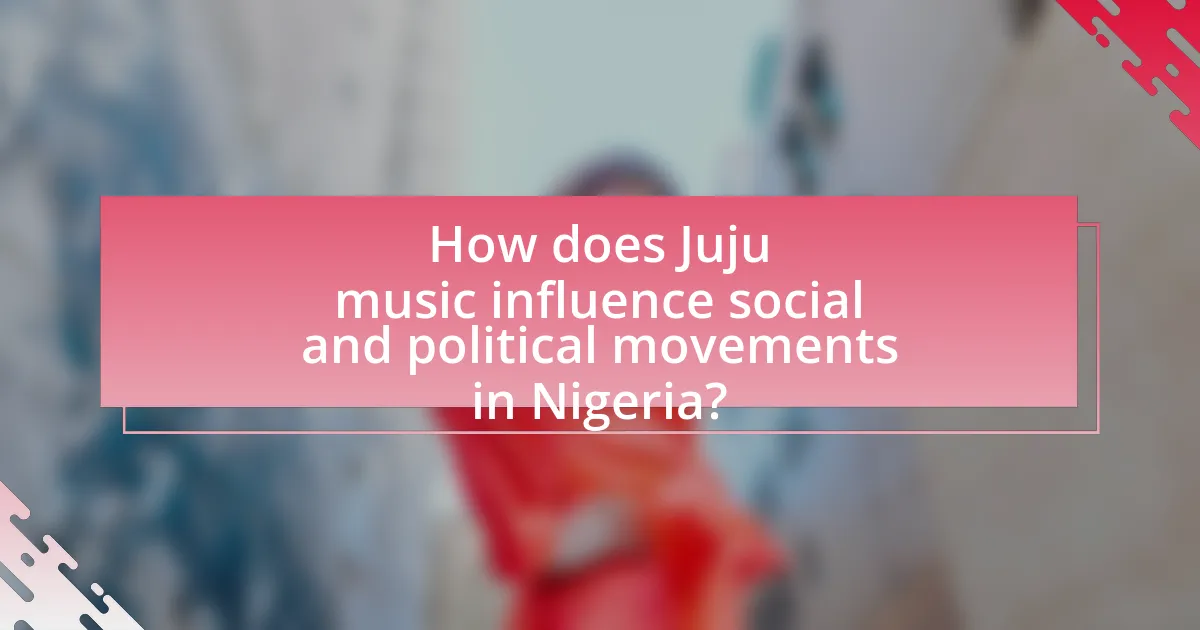
How does Juju music influence social and political movements in Nigeria?
Juju music significantly influences social and political movements in Nigeria by serving as a platform for political expression and social commentary. This genre, which emerged in the 1920s, has been utilized by artists to address societal issues, mobilize communities, and critique government policies. For instance, prominent Juju musicians like King Sunny Adé and Ebenezer Obey have incorporated themes of social justice and political awareness into their lyrics, thereby raising consciousness among listeners. Additionally, during Nigeria’s military regimes, Juju music became a vehicle for resistance, with artists using their songs to voice dissent and galvanize public sentiment against oppressive governance. This historical context illustrates how Juju music not only reflects the socio-political landscape but also actively shapes it by fostering a sense of identity and community among Nigerians.
What impact has Juju music had on political awareness in Nigeria?
Juju music has significantly enhanced political awareness in Nigeria by serving as a medium for social commentary and political mobilization. Artists like King Sunny Adé and Ebenezer Obey have used their music to address political issues, critique government policies, and promote civic engagement. For instance, during the military regimes in Nigeria, Juju music became a voice for the oppressed, with lyrics that highlighted corruption and called for democratic governance. This cultural expression not only informed listeners about political realities but also inspired collective action, as seen in the 1990s when Juju music played a role in the pro-democracy movements. The genre’s ability to resonate with the masses has made it a powerful tool for raising political consciousness and fostering dialogue around governance in Nigeria.
How have Juju musicians addressed social issues through their music?
Juju musicians have addressed social issues through their music by incorporating themes of social justice, political commentary, and cultural identity into their lyrics. For instance, artists like King Sunny Adé and Ebenezer Obey have used their songs to highlight issues such as poverty, corruption, and the struggles of everyday life in Nigeria. Their music often reflects the socio-political landscape, providing a voice for the marginalized and fostering community awareness. This approach not only entertains but also educates listeners about pressing social concerns, making Juju music a powerful tool for social change in Nigeria.
What role does Juju music play in political campaigns and movements?
Juju music plays a significant role in political campaigns and movements in Nigeria by serving as a tool for mobilization and communication. This genre of music, characterized by its rhythmic beats and engaging lyrics, is often used by politicians to connect with the electorate, convey messages, and rally support during elections. For instance, during the 1999 elections, prominent Juju musicians like King Sunny Adé and Ebenezer Obey were actively involved in campaigns, using their music to promote candidates and political ideologies. The incorporation of Juju music into political rallies not only entertains but also reinforces cultural identity and solidarity among supporters, making it an effective medium for political expression and influence.
How does Juju music foster unity among diverse groups in Nigeria?
Juju music fosters unity among diverse groups in Nigeria by serving as a cultural bridge that transcends ethnic and linguistic barriers. This genre, which blends traditional Yoruba music with modern instruments and influences, creates a shared experience that resonates with various communities. For instance, Juju music’s popularity in social gatherings, weddings, and festivals encourages participation from individuals of different backgrounds, promoting a sense of belonging and collective identity. Additionally, the lyrics often convey universal themes of love, celebration, and resilience, further enhancing its appeal across diverse audiences. The widespread acceptance and integration of Juju music into Nigerian society exemplify its role in fostering social cohesion and cultural harmony.
In what ways does Juju music bridge cultural and ethnic divides?
Juju music bridges cultural and ethnic divides by incorporating diverse musical elements and fostering communal participation. This genre, originating from the Yoruba people of Nigeria, integrates traditional African rhythms with Western instruments and influences, creating a sound that resonates across various cultural backgrounds. For instance, Juju music often features the use of electric guitars, synthesizers, and percussion, appealing to both urban and rural audiences. Additionally, Juju music serves as a platform for social commentary and unity, as artists address common societal issues, thereby promoting a shared cultural identity among different ethnic groups. The widespread popularity of Juju music, exemplified by artists like King Sunny Adé, demonstrates its role in transcending ethnic boundaries and fostering a sense of belonging among listeners from diverse backgrounds.
How do Juju music festivals promote social cohesion?
Juju music festivals promote social cohesion by bringing together diverse groups of people to celebrate shared cultural heritage and values. These festivals create a communal atmosphere where individuals from various backgrounds engage in collective experiences, fostering unity and mutual understanding. For instance, the annual Oyo State Festival attracts thousands, including different ethnicities, who participate in music, dance, and traditional rituals, reinforcing social bonds. Additionally, the collaborative nature of Juju music, which often involves communal performances and audience participation, enhances interpersonal connections and strengthens community ties.
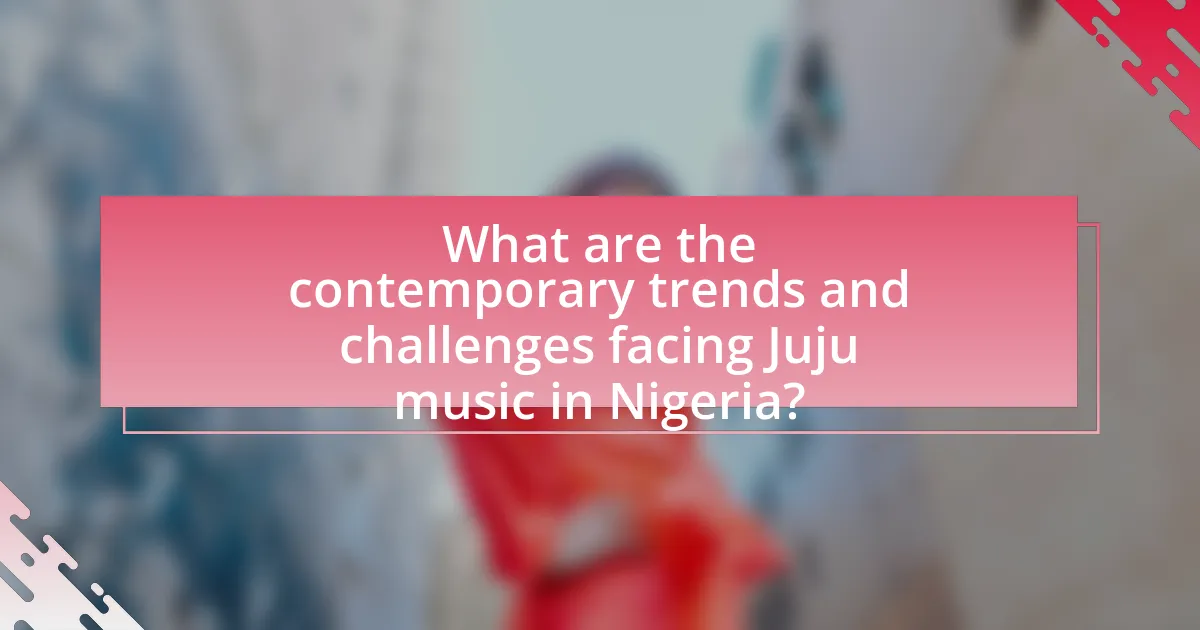
What are the contemporary trends and challenges facing Juju music in Nigeria?
Contemporary trends in Juju music in Nigeria include a fusion with other genres such as hip-hop and Afrobeats, which attracts younger audiences and revitalizes the genre. Additionally, the use of digital platforms for distribution and promotion has increased, allowing artists to reach a global audience more effectively. However, challenges facing Juju music include competition from other popular music genres, which can overshadow its traditional appeal, and the struggle to maintain cultural authenticity in a rapidly changing musical landscape. Furthermore, economic factors and limited access to funding for artists hinder the growth and sustainability of Juju music.
How is Juju music adapting to modern influences and technology?
Juju music is adapting to modern influences and technology by incorporating contemporary sounds and digital production techniques. Artists are blending traditional Juju rhythms with genres like hip-hop and R&B, utilizing electronic instruments and software to create innovative sounds. For instance, musicians are increasingly using digital audio workstations (DAWs) for recording and mixing, which allows for greater experimentation and accessibility. This evolution is evident in the works of contemporary Juju artists who have successfully integrated modern themes and production styles, thereby reaching a broader audience and maintaining relevance in the music industry.
What role do digital platforms play in the promotion of Juju music?
Digital platforms play a crucial role in the promotion of Juju music by providing widespread accessibility and facilitating global reach. These platforms, such as streaming services and social media, allow artists to share their music with a broader audience beyond local communities. For instance, platforms like Spotify and YouTube enable Juju musicians to upload their tracks, reaching millions of listeners worldwide, which significantly enhances their visibility and potential fan base. Additionally, social media channels like Instagram and Twitter allow for direct engagement between artists and fans, fostering a community around Juju music and encouraging its cultural exchange. This digital presence not only preserves the genre but also revitalizes interest among younger generations, ensuring its continued relevance in contemporary music scenes.
How are younger artists reshaping the Juju music genre?
Younger artists are reshaping the Juju music genre by incorporating contemporary sounds and technology, which modernizes its traditional roots. They blend Juju with genres like hip-hop and electronic music, attracting a younger audience and expanding its appeal. For instance, artists such as Wizkid and Olamide have integrated Juju elements into their music, showcasing its versatility and relevance in today’s music scene. This fusion not only revitalizes the genre but also preserves its cultural significance while making it accessible to a global audience.
What challenges do Juju musicians face in the current music industry?
Juju musicians face significant challenges in the current music industry, primarily due to the decline in traditional music appreciation and competition from contemporary genres. The shift in consumer preferences towards pop and hip-hop has diminished the audience for Juju music, which relies heavily on cultural and traditional elements. Additionally, the lack of adequate funding and support for Juju artists limits their ability to produce high-quality recordings and promote their work effectively. According to a 2021 survey by the Nigerian Music Industry Coalition, 65% of traditional musicians reported difficulties in securing performance opportunities compared to their contemporary counterparts, highlighting the economic pressures faced by Juju musicians.
How does commercialization affect the authenticity of Juju music?
Commercialization significantly impacts the authenticity of Juju music by prioritizing marketability over traditional elements. As artists adapt their sound and performance styles to appeal to broader audiences and commercial success, the original cultural and spiritual contexts of Juju music often become diluted. For instance, the incorporation of modern instruments and pop influences can overshadow the traditional rhythms and themes that define Juju music’s heritage. This shift has been documented in various studies, such as the research by Akinwumi Isola in “The Evolution of Juju Music in Nigeria,” which highlights how commercial pressures lead to a departure from the genre’s roots, ultimately affecting its cultural significance.
What are the economic challenges for Juju musicians today?
Juju musicians today face significant economic challenges primarily due to declining live performance opportunities and competition from digital music platforms. The rise of streaming services has shifted consumer preferences, leading to reduced demand for traditional live performances, which historically provided a substantial income for Juju artists. Additionally, many Juju musicians struggle with inadequate financial support and investment, limiting their ability to produce high-quality recordings and promote their music effectively. According to a 2021 report by the Nigerian Music Industry Coalition, live performance revenues for traditional musicians have decreased by approximately 40% over the past five years, highlighting the financial strain on Juju musicians in the current economic landscape.
What practical steps can be taken to preserve and promote Juju music in Nigeria?
To preserve and promote Juju music in Nigeria, establishing educational programs that teach the history, instruments, and techniques of Juju music is essential. These programs can be integrated into school curriculums and community workshops, ensuring that younger generations understand and appreciate this cultural heritage. Additionally, organizing festivals and live performances featuring Juju artists can enhance visibility and engagement, attracting both local and international audiences. Collaborating with media outlets to broadcast Juju music and documentaries can further raise awareness and appreciation. Supporting local artists through grants and sponsorships will also provide them with the resources needed to create and innovate within the genre, ensuring its continued evolution and relevance.
